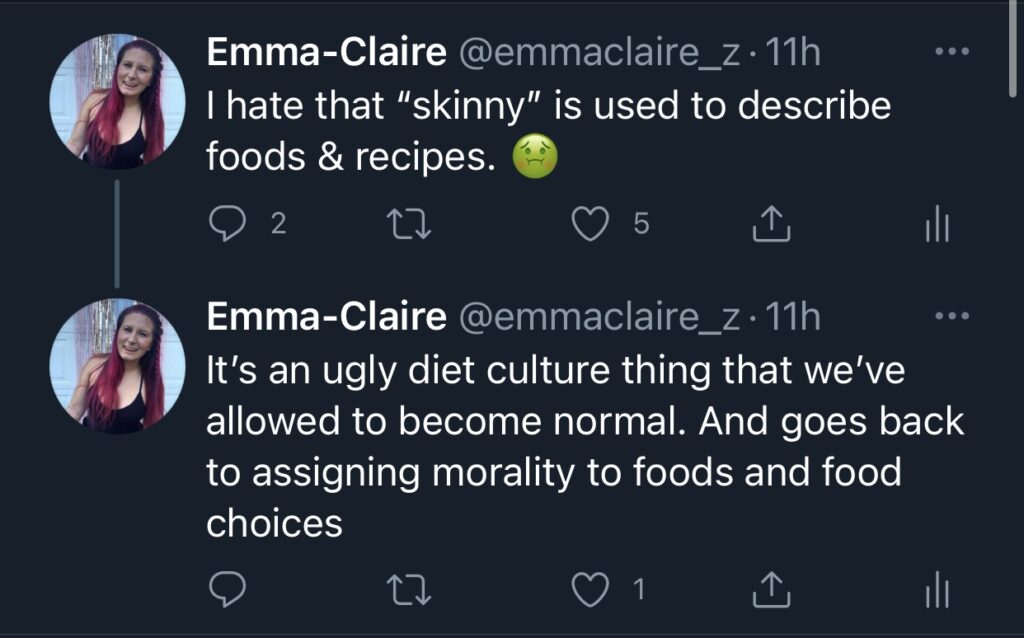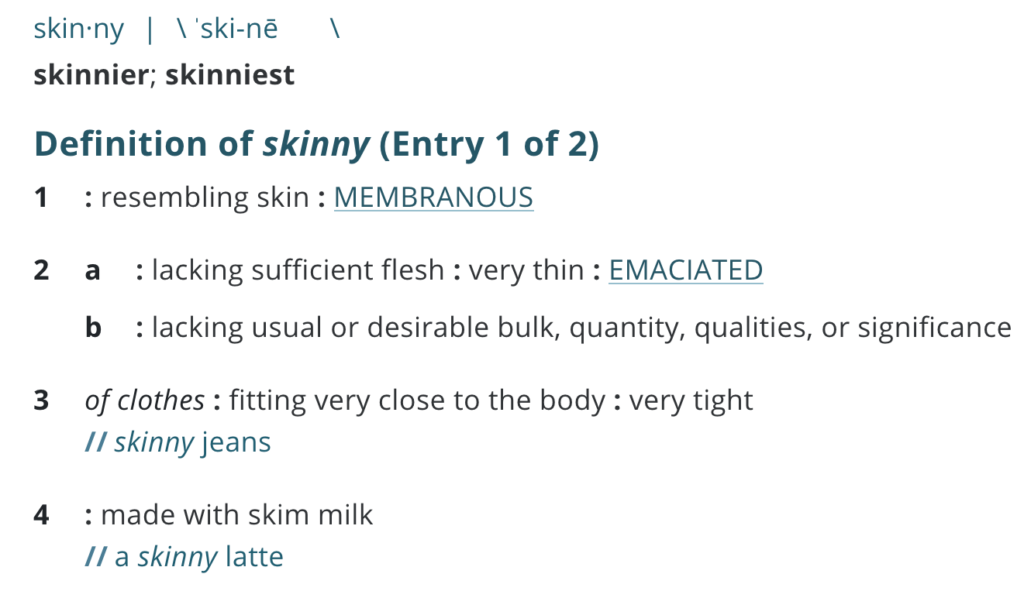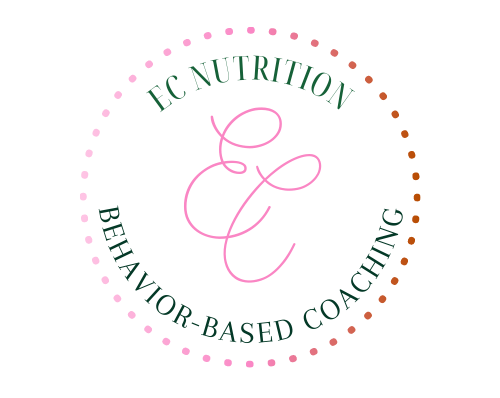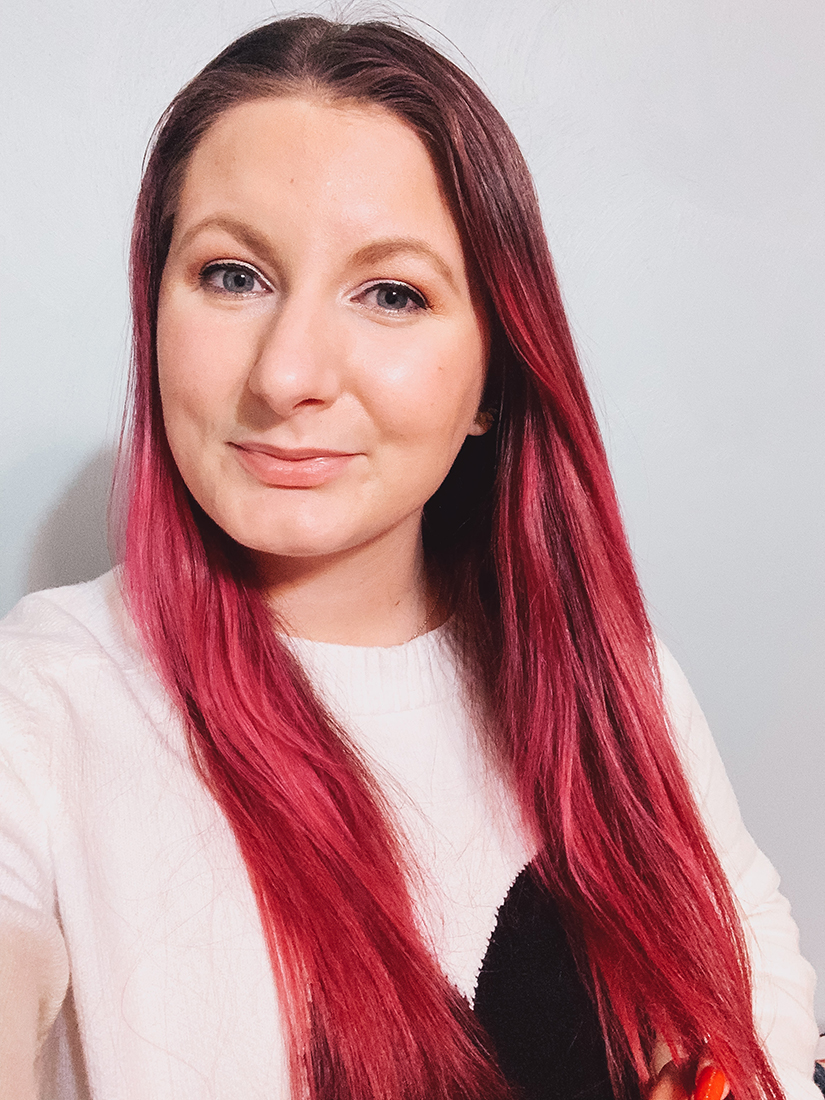Yesterday, on Cinco de Mayo, my sister sent me this video by Graeme Tomlinson about toxic weight loss products sold in pharmacies purporting to help customers. She said I’d like the video and agree with its sentiments. She wasn’t wrong. I think it’s a great video. Why on earth are pharmacies allowed to sell such harmful products?? Then, after a margarita, I was scrolling through my socials and saw so many toxic posts. So many advised skipping chips and dip altogether. Some detailed why you shouldn’t be eating out in the first place. One even posted about people watching and guessing how many calories others were eating – WTF?! Also, weird superiority complex. I also saw “skinny” margarita recipes, Keto/low-carb tacos, and so on. I work in the health and wellness industry, so I knew these posts were coming. They always do with holidays, but last night it was extra frustrating – probably because of the tequila. So I tweeted this:

Despite it being tweeted in a little bit of anger, I stand by it today. If you went to the tweet, you’d also see a chat between a client and me about how “skinny” has been so normalized it isn’t something we think about anymore. Then I got thinking about how “skinny” is marketed and who it is marketed to. So here we are. Let’s dive in.

Look at the Merriam-Webster Dictionary definition of the word “skinny.” Definition 2 gives two definitions for using skinny when talking about bodies. The second is particularly problematic as it introduces the idea of desirability to the word skinny. We all know this connection. Particularly, through the way skinny is marketed. When used in advertisement skinny is typically used as a positive or enticing descriptor.
Have you ever noticed that most products marketed to men are described as strong, fit, and muscle enhancing rather than weight loss or skinny? But women are mainly marketed “skinny” products to fit within the slim western beauty ideal – skinny teas, flat tummy gummies, wraps, pills, meal replacement shakes, “skinny” versions of treats, “skinny” alcoholic beverages, weight loss supplements. This list could go on and on and on. I’ve even seen protein powder ads targeting women promoting weight loss instead of strength. My client pointed out that even clothing marketed to women is described as skinny – skinny jeans or ladies cut t-shirts, anyone? But the main messaging from these products is, as a woman, you should be “skinny.” Your value comes from staying slim, and you should consume these products to either get or stay that way.
Thinness is nothing new in fashion. From the Victorian era with corsets to the 1990’s heroin chic, thinness has become the ideal for women. The ideal level of slimness has changed, but the concept has not. A woman must transform her body – through force if needed – to fit into the skinny beauty mold. More recently, some countries have banned extremely thin models, and many brands aim for a more “fit” or real model; However, the average model still mostly fail to encompass the range of strong, capable bodies of women in the world.
In the food industry, “skinny” describes anything from fewer calories to sugar-free to diet variations of food. It’s often attached to many diet products. Many times, these products are really no healthier than the non-“skinny” version of them. In fact, the changes made to make it “skinny” can decrease the satiety of the product, making you more likely to over-consume the product. Additionally, many of the supplements, pills, gummies, and similar products are not third-party tested. Their claims are often not factual, and they can contain harmful ingredients. Also, I think it’s important to note that many of these products, skinny teas, and detoxes are very expensive laxatives. Use of them does not cause real weight loss but explosive diarrhea and dehydration. Some health conditions require the use of the sugar-free or lower carb products. However, if you don’t have one of these health restrictions, I encourage you to ask yourself why you choose the “skinny” version rather than the other.
The messaging with “skinny” products is relatively simple – basically if you eat the “skinny” foods, you get the “skinny” body. This is just inherently false. In reality, this false equivalency is normalized diet culture rearing its ugly head into everyday life. Diet culture requires you to place morality on your food choices and define your self-worth based on those choices. In this morality, if “skinny” is good, then all other options are bad; and by choosing the “skinny” option, you are also good. However, if you don’t choose the “skinny” option, you have made the bad choice and should feel guilty about it. None of this is true. There is no morality attached to a slim body. You can eat the “non-skinny” versions of foods and still reach your aesthetic goals. There’s no way a body type or food choice can impact your worth as a human.
The word “skinny” has no place in food and recipes. When we look at the ways society uses the word “skinny,” it seems like it would be a positive all around, but as I researched the word and its history in food and fashion, I feel the opposite is true. Literally, the word itself means that something is lacking desirable qualities. That’s not food I want to eat. It’s not the food I want to create. And it’s not what I want my clients to strive towards. I’m not even sure if I’ll use it to describe bodies anymore. Aesthetic goals are 100% okay. But the implications attached to “skinny” just make me feel gross. I spent years and years chasing being “skinny,” but when I look back on everything I had to do to get there, it wasn’t even worth it and the results didn’t even last. What did last were injuries and sickness that I get to deal with every single day, just because I wanted to be skinny. It’s been a long journey to accept my less slim body, and I am still working at it. To be honest with y’all, this blog was a bit hard to write, but it also made me realize the messages we are inundated with about being “skinny” are toxic. It’s hard to have a healthy relationship with your body when everywhere you turn something is telling you to shrink it by whatever means necessary. While many brands have made strides to becomes size-inclusive and have started using more “real size” models, the industry has a long way to go as a whole. Furthermore, health and wellness brands need to evaluate if the products they’re marketing as “skinny” are conveying a message that aligns with their company ideals. I, personally, plan to remove “skinny” from the rhetoric I use about food, fashion, and my own body. I want to be healthy and strong.
After reading this, what do you think about the word “skinny” and its use for food and bodies??

